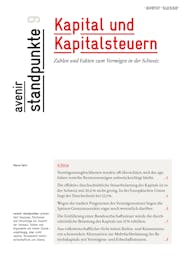Switzerland, as one of the richest states in the world, is no exception. Data for 2013 show Switzerland was the only country globally with gross wealth per capita for its adult population of more than $500,000 (Credit Suisse 2014). In recent years, numerous cantonal and federal referendums have been proposed with the aim of raising taxes on capital. But how is wealth in Switzerland actually distributed? And to what extent is capital already taxed?
Economist Marco Salvi answers these questions in the latest «avenir standpunkte» publication. His has two key conclusions:
First, wealth in Switzerland is actually distributed far more equitably than the bare statistics suggest; the pensions system, in particular, smoothes differences, with Switzerland ranking fourth in Europe in terms of redistribution.
Second, the level of capital taxation in Switzerland is generally underestimated. Taking all levies together and based on common methodology introduced in Europe by Eurostat last year, total taxation on capital is only slightly below the European Union average. Switzerland’s effective average tax burden of 20.6% is not negligible, according to Avenir Suisse’s calculations – the first of their kind in Switzerland – and compares with an EU average of 23.1%. Moreover, the markedly progressive nature of higher rates in Switzerland makes top rates significantly higher.
In 2012, taxes on capital and capital gains raised SFr48.9bn – a good 25% of total Swiss tax revenues. Likewise as a share of gross domestic product, capital taxation in Switzerland is no outlier: its proportion of 7.8% is only just below the EU mid level of 8.2% and significantly higher than neighbours Austria (6.6%) and Germany (6.2%).
Based on his analysis, Marco Salvi recommends a pause in any further taxation on capital and warns against new levies, such as the nationwide inheritance tax of 20 % on all wealth exceeding SFr2m being proposed in a referendum due in mid June. He calculates the introduction of such a levy would raise the average tax on capital by at least 15%.
He argues such caution is ultimately also in the interests of wage earners, as a high national stock of capital increases labour productivity – the true source of all pay rises.





